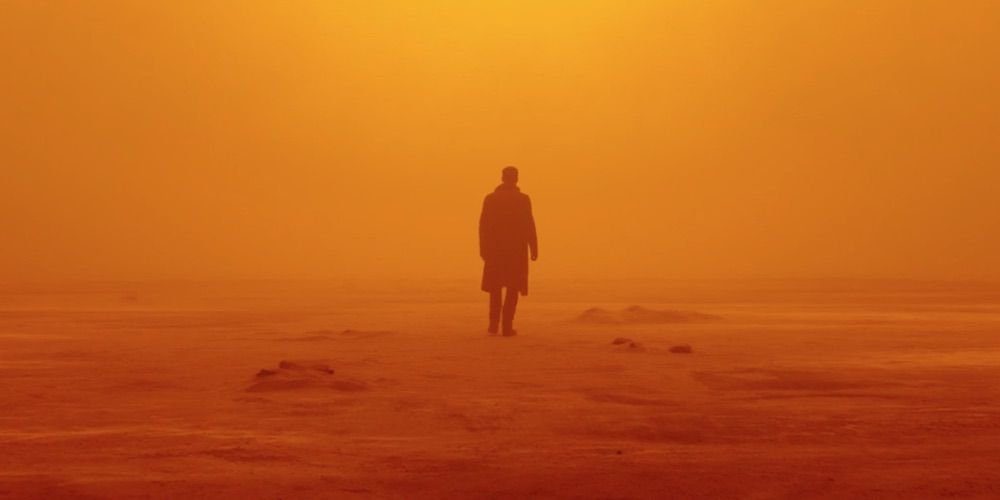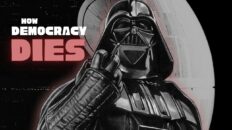“We find ourselves when we realize our place in an interconnected world. The struggle to pierce the darkness that shrouds us from realizing a state of perceptive awareness is the biggest part of both our individual story and our communal storyline.” ― Kilroy J. Oldster, Dead Toad Scrolls
***
The original Blade Runner is one of the few films that took me multiple viewings to begin to understand. I kept watching trying to figure out whether Harrison Ford’s Rick Deckard was a replicant or not. Which is, of course, one of the great questions in cinema along with, “What is Rosebud?” from Citizen Kane and what is in the box in the Coen Brothers’ Barton Fink? It wasn’t until I gave up in frustration upon my fifth viewing or so that I began paying attention to the rest of the film, specifically Rutger Hauer’s Roy Batty and his famous “Tears in Rain” speech, that it dawned on me that the question of whether Deckard was a replicant or not didn’t matter. The point was that it didn’t matter. Replicant or human, with lived or manufactured memories, both were alive and in possession of souls.
Blade Runner 2049 may be a nonessential sequel to the original, but it is gladly not unimportant, purposeless, or redundant as so many sequels turn out to be. While set in the same world as the original film and including characters from it—most notably Ford’s Deckard—Blade Runner 2049 feels less like a sequel than an expansion of its world. It stands on its own while expanding on the original film’s themes and blend of noir, science fiction, and philosophical themes.
The story structure is much more traditional than the original film—essentially a mystery/quest complete with quirky companions, unexpected allies, and a clear villain—but what it lacks in creative plot mechanics it makes up for in spades with robust, bright images from cinematographer Roger Deakins, powerful performances from Ryan Gosling in the leading role as well as supporting characters, an immersive, powerful score from Hans Zimmer and Benjamin Wallfisch, and the confidence to tell its story at its own pace under the guiding hand of director Denis Villeneuve (Sicario, Arrival).
The film dispenses with any question about Ryan Gosling’s character, K’s status as a replicant in its opening sequence as he “retires” an old model replicant played by Dave Bautista (if you’re mainly familiar with him as Drax in the Guardians of the Galaxy films, you might be taken by surprise by his sober, consequential performance in a small role here). K is a new model of replicant, lacking the agency of older models and designed to always obey, created by technology and business mogul Niander Wallace (Jared Leto) and his corporation to replace the older replicants as humanity’s slave labor. K works for the Los Angeles Police Department as a Blade Runner—law enforcement officers assigned to retiring (killing) replicants who have somehow managed to live well beyond the short lifespan they were originally designed for.
When K discovers one of the old model replicants gave birth to a child, his human superior (Robin Wright) orders him to find the child and retire it. The implications, of course, would change the established order and call into question the morality of using replicants as proxies in work and war, and as slave labor—of viewing them as sub-human. The brutality of slavery and the view by the humans in the film (of which there are few) of replicants’ exotic, amusing commodities is a primary concern. It is also repeatedly and explicitly condemned even by the words and actions of the humans who want to exploit the system.
As K pursues his quest to locate and deal with the replicant child, he becomes convinced—reluctantly at first—that he is the child: a miracle, a symbol, a savior. This is a staggering possibility to him. One that, after realizing a memory he thought was manufactured and implanted in him was real, allows him to openly question the restrictions society and his own mind have put upon him. It allows him the freedom to actively create and shape his own personal narrative.
The stories we tell ourselves in our own minds is another primary concern here. And the freedom to be able to shape them, and the ones we choose to tell, and how they affect the world around us give weight and substance to the film, like the ideas and questions about memory that gave weight to the original Blade Runner. Both of which might otherwise be merely exceptional stylistic productions.
Here is K, a replicant designed to obey and follow orders, gifted with implanted, manufactured memories in order to be able to relate emotionally as a fully formed adult even off the assembly line. This is the narrative the world has told him he is. This is the narrative he tells himself he is. Here is Joi (Ana de Armas), a hologram computer program, designed to be the perfect companion, and with upgrades that allow her to be mobile, untethered by the strings of physical hardware. When Joi tells K she is happy whenever he is with her, he questions the narrative of her programming, saying, “You don’t have to say that.” He is asking her to create her own narrative. Here is Luv (Sylvia Hoeks), Niander Wallace’s personal replicant assistant, who is named and not just a serial number, and is told she must be special, and tells herself she is special, that she is the best. Here is Niander Wallace who tells himself he is a God who will bring the stars to mankind and who will bring birth, not as a miracle, but as an assembly line, to the replicant creation-slaves. And here is Deckard, who cuts through the imposed narrative (both external and internal) who knows the truth: he knows who he is and has chosen a narrative for himself which takes the form of physical exile in the service of a greater narrative: love.
Once K allows himself to form his own narrative, he awakens to not just joy and love, but also disappointment and what we might call “reality.” How we form our narrative and our creativity in doing so——in service to self or our idea of mankind, or in service to individuals around us——is ultimately where the crux of this film lies. Be free, and in your freedom, choose to serve.








